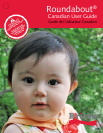
2
3
WARNING !
DEATH or SERIOUS INJURY can occur if the following
are not observed :
Use only with children who weigh between 2.3 – 18.1 kg (5 – 30 •
lbs) and whose height is between 55.9 – 101.6 cm (22 – 40 in.).
Use rear-facing for children who weigh between 2.3 – 13.6 kg (5 – •
30 lbs) and whose height is between 55.9 – 76.2 cm (22 – 30 in.)
Use forward-facing for children who weigh between 9.1 – 18.1 •
kg. (20 – 40 lbs) and whose height is between 68.6 – 101.6 cm
(27 – 40 in.).
This child seat must be in the recline position when installed rear-•
facing.
This child seat must be in the upright position when installed •
forward-facing.
Adjust the belts provided with this child seat so they fit snugly •
around your child. A snug strap should not allow any slack. It lies
in a relatively straight line without sagging. It does not press on the
child’s flesh or push the child’s body into an unnatural position.
Secure the top tether strap provided with this child seat.•
The child seat must be secured to the vehicle by means of a lower •
connector system if it is installed in a seating position that is equipped
with a lower universal anchorage system or by means of a vehicle
seat belt if it is installed in a seating position that is not equipped with
a lower universal anchorage system, and by means of a tether strap,
as shown in the installation instructions. Use of the tether strap is
required forward-facing and is optional rear-facing.
Follow all instructions on the child seat labels and in this user •
guide.
Register your child seat with the manufacturer, Britax Child Safety, •
Inc. by visiting www.BritaxUSA.com/registration, OR complete and
return the registration card that was shipped with this child seat.
To prevent injury due to deterioration or hidden damage, discontinue •
use of a child seat that is older than six years or has been in a moderate
or severe crash. See date of manufacture located on child seat (page
9).
This child seat must not be used in the home, in boats, or in other •
non-certified applications.
Based on crash statistics, it is recommended that parents select the •
back seat as the safest location for a properly installed child seat.
Please study the Vehicle Compatibility section on pages 10-11 to
ensure your child’s safety and consult your vehicle owner’s manual.
Secure this child seat even when it is not occupied. In a crash, an •
unsecured child seat may injure vehicle occupants.
When using in a vehicle with air bags, refer to your vehicle owner’s •
manual for child seat installation instructions and precautions.
Never use adjuster strap to lift or carry this child seat. Doing so could •
cause damage to harness adjuster and webbing. Always carry this
child seat by its shell or tether straps.
The primary protection for vehicle occupants in a collision is the •
body of the vehicle itself. A child seat will not protect a child when
a vehicle is seriously impacted. However, correctly installed, a child
seat will substantially improve the chances for survival in most
crashes. Make sure all users fully understand the correct ways to
use this child seat in a vehicle.


















